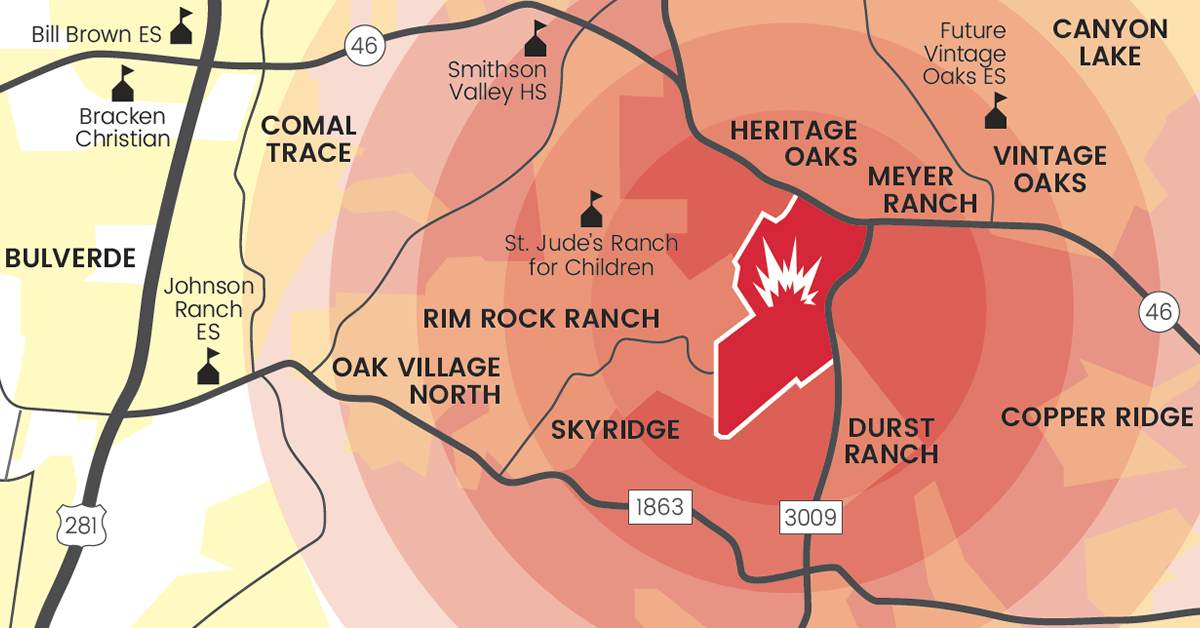In what some Comal County residents are calling a “slap in the face,” Texas’ Third District Court of Appeals in Austin on Thursday reversed a lower court’s decision to strip Alabama-based Vulcan Materials of the permit it needs to turn the former Eric White Ranch at FM 3009 and State Highway 46 into a 1,500-acre open-pit limestone quarry.
In November 2019, Texas Commission on Environmental Quality (TCEQ) granted Vulcan an air-quality permit for a rock crusher. Its decision followed several years of legal wrangling with an alliance of Comal County citizens, community groups, and Comal ISD.
Under Texas law, TCEQ can only permit a facility if it finds no indication it will harm the public’s health and physical property.
Opponents claimed the quarry would destroy property values, negatively impact water supply and quality, threaten the environment, harm nearby caves, and create traffic nightmares for over 15,000 residents who didn’t realize they’d purchased homes near a proposed major industrial development.
In March 2021, 459th Civil District Court Judge Maya Guerra Gamble agreed with them and overturned TCEQ’s decision to greenlight the permit.
TCEQ and Vulcan challenged her ruling to remand and vacate by filing a notice of appeal on April 30, 2021.
Speaking to MyCanyonLake.com in May 2021, Eric Allmon, an attorney with Austin-based Perales, Allmon & Ice, a public-interest environmental law firm, said it’s not uncommon for TCEQ to align itself with a permit applicant like Vulcan once a permit is granted.
Last week retired Judge J. Woodfin Jones, sitting on the appellate court by assignment and speaking for a three-judge panel, ruled in favor of TCEQ and Vulcan Material. He explained his decision in a 39-page court document. Appellate courts review procedures and decisions to ensure proceedings are fair and the law is applied correctly.
David Drewa, director of communications for Stop 3009 Vulcan Quarry and Preserve Our Hill Country Environment, described Jones’ ruling as a “slap in the face to the thousands of concerned citizens” and noted he is not an elected official.
“The panel showed no regard for relevant legal issues raised by Texans living and working in the area and essentially concluded Vulcan’s claims seem fine, and we trust them, no need to verify or even see the underlying data,” he said.
Jones used the term ‘de minimis’ no fewer than five times, Drewa said, adding the judge said expected contamination levels — based on 2017 modeling data submitted by Vulcan — are so low that no further investigation is needed.
Stop 3009 Vulcan Quarry and Preserve Our Hill Country Environment claim Vulcan’s air permit would allow the rock crusher to emit over 95,000 pounds of particulate matter, nitrogen oxide, sulfur dioxide, carbon monoxide and volatile organic compounds into the Hill Country annually.
Drewa also criticized the judge for ruling that although there is a chance Vulcan’s crystalline silica emissions would exceed established pollution limits, the company is not required to disclose sample data used to run its air-pollution modeling.
“Apparently we should take Vulcan’s word that its still-concealed data – the very basis for the modeling and these assertions of compliance – is accurate and reliable,” he said in a statement.
Stop 3009 Vulcan Quarry also took issue with Jones’ ruling that contamination from mining, product, transport, roads, and the quarry itself does not need to be considered and that background air-pollution levels could be predicted using data from monitors located 12 and 28 miles upwind from the proposed quarry location.
Vulcan did not respond to a request for comment about the judge’s ruling. The company is the nation’s largest producer of construction aggregates—primarily crushed stone, sand and gravel—and a major producer of aggregates-based construction materials, including asphalt and ready-mixed concrete.
According to Yahoo Finance, in 2021 Vulcan sold 222.9 million tons of aggregates, 11.4 million tons of asphalt mix, and 5.6 million cubic yards of ready-mix. As of Dec. 31, 2021, the company had nearly 16 billion tons of aggregates reserves.
Milann Guckian, who lives near the proposed quarry site and also serves as president of Stop 3009 Vulcan Quarry and Preserve Our Hill Country Environment, said Jones’ opinion sounds like something out of TCEQ’s playbook.
“It seems to me that the judge missed the point of our whole argument,” she said. “The silica content data came from Vulcan and we never had an opportunity to look at it, much less analyze, their samples.”
Drewa said his groups already are discussing next steps including rehearing requests and an appeal to the Texas Supreme Court.
Vulcan has yet to submit a Water Pollution Abatement plan (WPAP), which is required by law since Vulcan’s land is situated atop the Edwards Aquifer recharge zone, he said.




